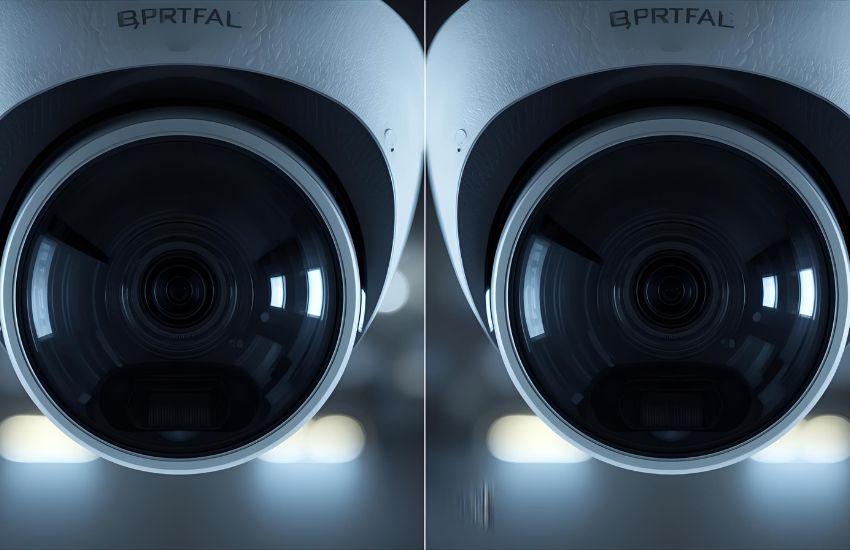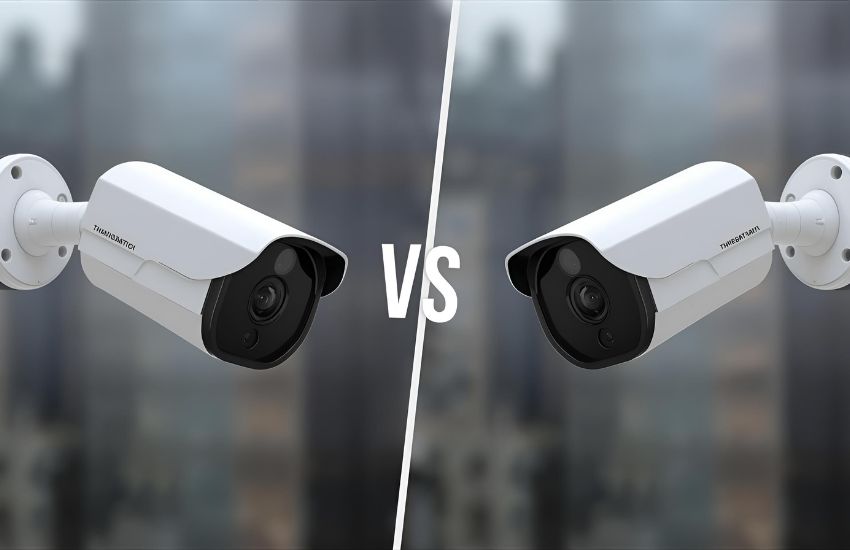Understanding the difference between a 4MP and a 4K camera is crucial when selecting the right security camera for your needs. Both options offer significant improvements over traditional 1080p cameras, but their differences in resolution, sensor capability, and image quality can impact the effectiveness of your surveillance system. While a 4MP camera provides a solid balance of detail and affordability, a 4K camera—with its higher megapixel count and advanced sensor technology—delivers exceptional clarity, especially useful for applications requiring detailed zoom or license plate recognition.
4MP cameras offer a resolution of 2560×1440 pixels, providing clear images suitable for most surveillance needs. In contrast, 4K cameras deliver a higher resolution of 3840×2160 pixels, capturing more detail and wider coverage. Choosing between 4MP and 4K depends on your budget, required image clarity, and monitoring area size.
Why a 4K IP Camera Offers Superior Zoom and Image Quality Over 1080p

Enhanced Resolution and Pixel Count: 4MP vs 4K
When comparing 4MP vs 4K security cameras, the difference in resolution is significant. A 4K security camera delivers approximately four times the number of pixels as a standard 1080p camera, offering ultra HD clarity that is essential for detailed video surveillance. While 4MP IP cameras provide a decent upgrade over 1080p HD, 4K resolution offers a much higher level of detail, allowing you to capture clearer images and finer details such as license plates or facial features. The 4MP image is closer to 2K in terms of pixel count, but it cannot match the 4K IP camera’s ultra HD quality.
Zoom Capabilities: Why 4K Outperforms 1080p Cameras
The ability to digitally zoom in without losing image quality is one of the most compelling advantages of a 4K security camera system. With many megapixels packed into each frame, you can zoom in on critical areas and still retain sharpness and clarity. In contrast, an 1080p camera’s resolution limits the effectiveness of digital zoom, often resulting in pixelated or blurry images when zoomed. Compared to 4MP security cameras, 4K IP cameras provide superior zoom capabilities, making them the preferred choice for surveillance scenarios demanding precise detail.
Advanced Sensor Technology in 4K Security Cameras
4K IP cameras also feature advanced sensor technology that enhances image quality in various lighting conditions. This sensor improvement, combined with higher resolution, results in superior 4K image quality that outperforms traditional 1080p cameras and many 4MP models. The increased number of pixels allows the camera to capture more information, translating to richer color depth and better contrast in your video surveillance footage.
Choosing Between 4K vs 1080p and 4MP Cameras for Your Security System
When deciding between 1080p camera vs 4MP IP or a full 4K security camera, you should consider your specific security needs and budget. Although 4MP security cameras offer an upgrade over 1080p HD, the 4K camera system’s higher resolution and enhanced zoom capabilities provide unmatched image clarity and detailed monitoring. For environments where identifying fine details is crucial, such as license plate recognition or monitoring large areas, investing in a 4K ultra HD security camera ensures you have the highest level of security camera resolution available.
See more about…Dome 4K IP Camera
Choosing Between 2K, 4MP, and 4K Security Cameras for Effective Surveillance

Choosing between 2K, 4MP, and 4K security cameras involves understanding the trade-offs in video resolution, storage requirements, and image quality to ensure effective surveillance tailored to your needs. While the resolution of 1080p HD has been a standard benchmark for years, advancements in camera technology have introduced options like 2K security cameras and 4MP models that offer enhanced detail and clarity beyond traditional HD resolution. However, the quality of 4K ultra HD video stands out significantly, delivering four times the resolution of 1080p, which means you get better image detail and a clearer picture quality.
When comparing 4MP or 4K options, it is important to recognize that 4K is also double the horizontal resolution of 4MP cameras, offering a higher level of precision in capturing critical details such as license plates or facial features. This makes 4K cameras especially valuable in security applications where clarity is paramount. Cameras like the Amcrest 4K model provide ultra HD video that can greatly enhance your surveillance system’s effectiveness. However, it is worth noting that 4K cameras require more storage due to their increased video resolution and file sizes, which may influence your system setup and maintenance.
Despite these storage considerations, cameras offer superior image quality that can justify the investment, especially when compared to 4MP or 2K security cameras. The horizontal resolution and ability to capture fine details ensure that a 4K camera can deliver a better image overall. You should weigh your surveillance priorities, including the need for ultra-clear images versus storage and bandwidth constraints, to choose the most appropriate camera system for your environment. Understanding these factors will help you optimize your security infrastructure with the right balance of resolution and performance.
See more about...4K PTZ Camera
Conclusion
Choosing the right security camera involves careful consideration of various camera models and their capabilities. Whether you opt for a single 4K camera or a 4MP alternative, the key is ensuring that the image is closer to 4K quality to provide the clarity needed for effective surveillance. Proper camera installation plays a crucial role in maximizing the potential of your chosen system, ensuring that you get a better experience with sharper images and more reliable monitoring. Ultimately, investing in the right camera technology tailored to your security needs will enhance overall safety and peace of mind.
See more about…4K Security Camera Facial Recognition
Frequently Asked Questions (Understanding the Difference: 4mp vs 4k for Choosing the Right Surveillance Camera)
What is the difference between 4K and 4MP cameras?
The main difference between 4K and 4MP cameras is resolution. A 4K camera offers about 8 megapixels (3840×2160), delivering higher clarity, sharper details, and better zoom quality. In contrast, a 4MP camera provides around 2688×1520 resolution, suitable for general monitoring but with less detail. Thus, 4K is ideal for critical surveillance requiring precision.
What is the difference between MP and K cameras?
The main difference between MP (megapixel) and K (resolution) cameras lies in measurement. MP refers to the total number of pixels a camera sensor captures, e.g., 4MP equals about 4 million pixels. K indicates horizontal resolution, e.g., 4K means around 3840 pixels across. Higher MP improves image detail, while higher K enhances display resolution.
Is 4 megapixels good for security cameras?
Yes, 4-megapixel security cameras are good as they offer clear image quality with better detail than standard 2MP or 1080p cameras. They provide sharper footage, making it easier to identify faces, license plates, and small objects. 4MP cameras balance quality and storage needs, making them a reliable choice for homes and businesses.
How to choose the best surveillance camera?
To choose the best surveillance camera, consider resolution for clear images, night vision for low-light monitoring, and wide field of view for broader coverage. Check storage options like cloud or DVR, motion detection, and remote access via mobile apps. Weatherproof and durable designs suit outdoor use. Match features with your security needs and budget
